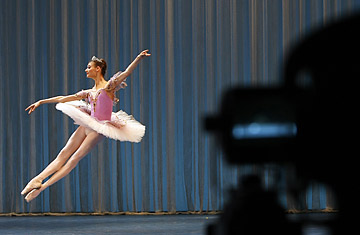
Russian ballerina Anastasiya Soboleva performs at the XI International Ballet Competition at the Bolshoi Theater in Moscow on June 20, 2009
The rose-and-white-columned façade of Russia's famed Bolshoi Theater has stood shrouded in construction curtains and spiky scaffolding for four years — and it looks to stay that way longer still, as the sudden resignation of the theater's musical director has pitched the future of the Bolshoi and its multimillion-dollar renovation into disarray.
Alexander Vedernikov's dramatic exit was the climax of a battle between the director and the theater's management over the revamp of the Bolshoi, a nearly 200-year-old icon of Russian culture just a five-minute walk from the Kremlin. "I resigned because of a disagreement with the administrators over their policies on some major development issues and over the artistic future of the theater," Vedernikov told TIME in a phone interview from his hotel in Milan, from which he is leading the Bolshoi on a summer tour of Italy — potentially his last for the theater. "We disagreed because I believe the primary logic in making decisions for the theater should be artistic, but now the primary logic is bureaucratic — and this has nothing in common with artistic issues."
After decades of neglect, the Bolshoi had deteriorated into a firetrap, and by the time the renovation started, more than 70% of the theater's foundation had been eroded by an underground stream. Worse still — at least, for Russia's music lovers — damage caused by construction of the Moscow Metro in the 1930s and a bomb hit during World War II had forced the theater to replace the wood panels on the walls with concrete in the 1950s, ruining the acoustics. Eventually, with support from UNESCO, the government decided to fund a $700 million reconstruction project, which was started in 2005. Although originally scheduled to be completed in 2009, Minister of Culture Alexander Avdeyev said in February that the building would not be ready until the middle of 2011.
Observers say that during the course of the restoration, the theater's administration has been focusing on the reconstruction of the building and taking little interest in the artistic aspects of the revamped theater. "There is a tendency to think of the Bolshoi as a building — to think of it as a brand," says Raymond Stults, a critic who has written about the Moscow opera scene for 15 years. "After a successful tour in Paris a few years ago, one of their ballerinas said to me, 'Finally the management realizes that it's not about them and it's not about the building — it's about us.' But I don't know how long that feeling was maintained."
German firm Müller-BBM, a leader in its field, had been hired at the start of the reconstruction to bring the theater's acoustics back to their former glory. However, in the past few months, as the financial crisis has torn through Russia, Vedernikov learned that the firm's contract had not been renewed. A Russian institute without Müller-BBM's expertise has been brought in to carry out the work instead — a move to which the music director is vigorously opposed. "When I hear [Moscow Mayor Yuri Luzhkov say] that it is very important to open the theater in 2011, I always think that it is not so important when the theater opens because the reconstruction is very difficult and complex," says Vedernikov. "Instead, in this situation, the quality of what is going to be done is far more important ... I have nothing to expect but a disastrous result."
The theater has said it does not plan to replace the music director anytime soon. "His decision didn't come as a surprise," says Katerina Novikova, the Bolshoi's chief spokeswoman, echoing statements made by the theater's general director, Anatoly Iksanov, to the Russian press. "The Bolshoi management feels that the years that Mr. Vedernikov was with the company were fruitful, but maybe it is time [to move on]." Five prominent Russian conductors will now pass through the music director's role in Vedernikov's place, though the Bolshoi says he is welcome to come in as a guest conductor whenever he wants.
But the dramatic rupture on July 20 was about more than technical and financial issues. Also at play were different management styles and views on what direction the Bolshoi should take next — a clash that is possible only in a vibrant creative environment that encourages varying philosophies, something that's rare in the world of Russian theater, with its lingering Soviet ethos. "The Bolshoi Theater actually operates quite well as a theatrical organism. It is not like some other theaters where one man decides everything," says spokeswoman Novikova, making a reference to the Mariinsky Theater in St. Petersburg, which has grown to outshine the Bolshoi under the strong — some say autocratic — hand of artistic director and conductor Valery Gergiev. "In the Bolshoi, we have a structure where everyone has their own responsibility and makes their own decisions."
That structure has helped create some world-class performances. But Vedernikov's resignation will leave a gaping hole in the theater's leadership, which can only worsen the Bolshoi's physical and artistic predicament.
